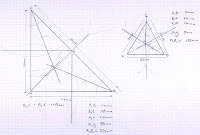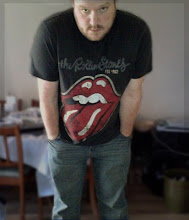 I was going through my file today and I stumbled on something that I had been working on whilst subbing maths in a local grammar school. While I was there I was inspired to break out of the little box that constrains me, that stamps the label ‘literary arts and humanities’ on my forehead. I wanted to do something that would shatter the boundaries of perceived consciousness forever. I wanted to be the first English teacher to discover a modern mathematical law.
I was going through my file today and I stumbled on something that I had been working on whilst subbing maths in a local grammar school. While I was there I was inspired to break out of the little box that constrains me, that stamps the label ‘literary arts and humanities’ on my forehead. I wanted to do something that would shatter the boundaries of perceived consciousness forever. I wanted to be the first English teacher to discover a modern mathematical law.For too long we have been told that there are those who are good at creative tasks, those who are good with their hands, those who are good at seeing the big picture, those who are good at problem solving, those who are good with people, those who are good with shapes, those who are good with numbers, those who are good with words, those who are good with money, those who are good at spending money. Can we not shave off harsh corners and become more rounded individuals? Can a mathematician not write a sonnet? Can an artist not paint a scientific truth? A sociologist not gaze in wonder at a rock formation? A Historian not appreciate the idiosyncratic features of a foreign language?
Can a writer not master calculus?


If Leonardo Devinci teaches us anything it’s that we can multiskill. A painter, a mathematician, an inventor, an anatomist, a sculptor, an engineer, a botanist, a technologist, a musician, a linguist, a scientist, an author… Now he would have made a damn fine substitute teacher.
 So I set about creating a formula that would change the world – and possibly make carbon neutral space travel a reality. I sharpened my pencils, looked out my most accurate rulers, protractors, compasses… and began
So I set about creating a formula that would change the world – and possibly make carbon neutral space travel a reality. I sharpened my pencils, looked out my most accurate rulers, protractors, compasses… and beganSo there we have it. Mr C’s law of… well, I don’t know what it’s a law of. I only said I’d come up with it – I didn’t mention actually suggesting what it does. However I did take a stab at explaining how it works for those who, like me, feel more comfortable in the realms of literary classics than mathematical genius

And for those who struggle with my infantile scribbling:
The quality of κ is not constrain’d,
It droppeth as the gentle rain from the hypothenuse
Upon the adjacent beneath. It is twice factored;
It factors the χ that adds and the ў that subtracts.
‘Tis greatest in the versin; it becomes
The triangle better than cosine;
His right angle shows the definite integral, 2α + κν;
It is enthroned in the hearts of trigonometric functions;
It is an attribute of Leibniz himself;
And mathematics pure doth then show likest Leibniz
When trigonometry doth season calculus. Therefore literaturalist,
Though poetical prose be your plea, consider this:
That in the course of geometry, none of us
Should see polynominals. We do pray for prime numbers
And that same prayer doth teach us all to render…
…The ratio of κ (to ½π²)
I thank you.



 But back to the mysterious photo. It certainly looks the part, no? Unfortunately I remain unconvinced. I think perhaps I would be less sceptical if the photographer who took it wasn't in the process of taking publicity shots for the Museum's new 'Ghosts in the Attic' exhibition. A photo of a ghost in the attic when they're having a exhibition about ghosts in attics? It's all a little convenient,
But back to the mysterious photo. It certainly looks the part, no? Unfortunately I remain unconvinced. I think perhaps I would be less sceptical if the photographer who took it wasn't in the process of taking publicity shots for the Museum's new 'Ghosts in the Attic' exhibition. A photo of a ghost in the attic when they're having a exhibition about ghosts in attics? It's all a little convenient, 


